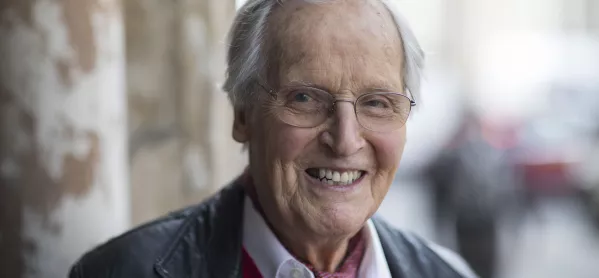This article was originally published in Tes in 2011.
When I was young, I was afflicted with a stutter, probably because I was born left-handed but was forced to use my right hand as a child.
I was also mildly dyslexic. It wasn’t the ideal start for a youngster determined to become an actor.
I did two years at a boarding prep school from the age of 8, which were horrendous.
Eventually, my parents realised I was very unhappy and got me placed at Colet Court, the preparatory school for St Paul’s School.
An unusual character
I was blessed at both these schools with very good teachers.
Some people become teachers because it is a calling. They have skill and inspiration. I remember a few teachers like that. They all taught classics. So I became a classics scholar.
TL Martin was an interesting man, with a flair for imparting knowledge to children. He had a rather corpulent figure and looked like GK Chesterton, who was his idol.
He wasn’t always treated with the respect he deserved, because he was an unusual character.
In my class, though, we had huge respect for him. He had a gift and I was inspired by him.
He would break off from teaching and say, “Would you like to hear a story?” Then he would tell an anecdote from Greek mythology and hold us spellbound.
Different world
I wanted to be an actor from the earliest I can remember. But my parents insisted on a formal education and I accepted that.
The world was very different then. We didn’t do as we wanted. We did as we were told.
I was blissfully happy at St Paul’s and am now a patron of the school rebuilding and bursary scheme. Discipline was strict, but was administered with understanding and tolerance. The atmosphere was sympathetic and congenial.
There was a great year for me. I came top of the class. I won caps at rugby and cricket for the under-16 colts side.
Most of the pupils that year went on to great things in their professions.
I have always remembered Mr Martin. I was very lucky to have him as my form teacher that year.
On a train to Scotland
But the year was 1939. Nothing would ever be the same again.
When the war began, my school was evacuated to Berkshire. So my parents sent me to another school in North London, where I passed my school certificate, the equivalent to present-day GCSEs. I was 16.
I still wanted to be an actor, but my father said: “We know all about that, but let’s be serious.”
My Uncle Hugh, my father’s brother, noticed how capable I was with my hands and through friends got me an apprenticeship at Drysdale’s, a pump and turbine firm on Clydebank. The next thing I knew, I was on a train to Scotland.
The firm said I needed a technical education. I went to Glasgow University, told them my qualifications, and they said I could be admitted to any faculty except science or engineering.
So I studied in the evenings, passed Higher maths, and began an engineering course at the university, while serving my apprenticeship.
Making people laugh
The next four years at Drysdale’s were hard. I’m not sure how I survived. I must have seemed very strange to them, with my English public-school accent and manners.
But I have always been able to make people laugh. I am proud of the fact that I was accepted by the apprentices on Clydeside, and by the men.
I survived. I achieved something. I have always driven myself on to do what’s necessary. Maybe it is an instinct. Maybe it is something instilled in me during my schooldays, by teachers such as TL Martin.
Nicholas Parsons was talking to Douglas Blane



